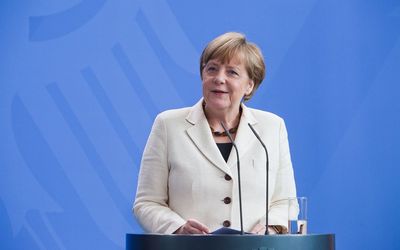Germany and SA should share insights
by Walter J Lindner,
2015-11-10 05:55:56.0
WHEN President Jacob Zuma and Chancellor Angela Merkel meet on Tuesday in Berlin, their minds may well be preoccupied with domestic concerns.
Merkel’s thoughts might be on the unprecedented challenge Germany is facing in wake of the refugee crisis in Europe. For the past few months, thousands of refugees have been crossing into Germany every day, fleeing war-torn countries such as Syria and Afghanistan. According to some estimates, Germany will have an influx of more than 1-million refugees this year alone.
Zuma may be thinking of the severe drought conditions in SA and their effect on the already sluggish economic growth. And he will most certainly be considering how new jobs can be created for the youth in a general economic slowdown.
The challenges Germany and SA are facing have two things in common. First, they both have global causes and cannot be solved by individual countries. Second, for both problems one partner can share valuable insights with the other. SA has much experience with the challenges posed by a large number of refugees and can share lessons learned. And as preferred destinations for refugees, our two countries should also be looking at joint international initiatives to tackle the underlying reasons for migration.
Germany enjoys the lowest level of youth unemployment in Europe, partly due to our successful vocational training programmes in co-operation with the private sector. The South African delegation will be briefed on the German experiences to see what can be passed on to support the government’s effort to reduce youth unemployment.
Together, Germany and SA can also contribute to the success of the climate talks in Paris this year. The German and South African energy partnership can be a key driver for the future of renewable energy on the continent. Together, Germany and SA can propose strategies for the Group of 20 to moderate the consequences of falling growth rates in East Asia for the global economy.
In many ways, Germany and SA are natural partners in globalisation. Given our economic and political weight, we carry a special responsibility for our respective home regions. We are both committed democrats and proven defenders of human rights as well as international law. And we have open economies that are deeply intertwined with global markets. Our people-to-people contacts are strong. More than 600 German companies sustain almost 100,000 jobs in SA.
More than 300,000 German tourists visit SA every year. Young people from both countries take part in cultural exchange and internship programmes. Both sides should do everything to maintain this high level of intercultural exchange including through our visa regimes.
It is often said that SA will eventually have to decide between the Brics (Brazil, Russia, India and China and SA) partners and western countries. I think this notion of competing spheres of influence is misleading. It will not help us move forward in our interconnected world of the 21st century. Today’s global problems need global solutions. In consequence, we do not need power games, we need joint problem solving.
SA’s foreign policy since 1994 has a tremendous track record — as a staunch advocate of international law and human rights, as conflict mediator and peacekeeper, as a champion of African integration, as successful host of the Durban climate talks, to name just a few highlights.
SA’s progressive constitution and vivid democracy are a beacon for Africa. The Mandela legacy has inspired young leaders around the world. Today’s troubled world needs the important voice of SA.
Germany, the European Union and SA have the potential to make a major contribution towards tackling many of today’s global challenges, ranging from climate change to global migration flows and the spread of terrorism and instability. Let’s do this together.
• Lindner is German ambassador to SA

Angela Merkel. Picture: BLOOMBERG/ROLF SCHULTEN
WHEN President Jacob Zuma and Chancellor Angela Merkel meet on Tuesday in Berlin, their minds may well be preoccupied with domestic concerns.
Merkel’s thoughts might be on the unprecedented challenge Germany is facing in wake of the refugee crisis in Europe. For the past few months, thousands of refugees have been crossing into Germany every day, fleeing war-torn countries such as Syria and Afghanistan. According to some estimates, Germany will have an influx of more than 1-million refugees this year alone.
Zuma may be thinking of the severe drought conditions in SA and their effect on the already sluggish economic growth. And he will most certainly be considering how new jobs can be created for the youth in a general economic slowdown.
The challenges Germany and SA are facing have two things in common. First, they both have global causes and cannot be solved by individual countries. Second, for both problems one partner can share valuable insights with the other. SA has much experience with the challenges posed by a large number of refugees and can share lessons learned. And as preferred destinations for refugees, our two countries should also be looking at joint international initiatives to tackle the underlying reasons for migration.
Germany enjoys the lowest level of youth unemployment in Europe, partly due to our successful vocational training programmes in co-operation with the private sector. The South African delegation will be briefed on the German experiences to see what can be passed on to support the government’s effort to reduce youth unemployment.
Together, Germany and SA can also contribute to the success of the climate talks in Paris this year. The German and South African energy partnership can be a key driver for the future of renewable energy on the continent. Together, Germany and SA can propose strategies for the Group of 20 to moderate the consequences of falling growth rates in East Asia for the global economy.
In many ways, Germany and SA are natural partners in globalisation. Given our economic and political weight, we carry a special responsibility for our respective home regions. We are both committed democrats and proven defenders of human rights as well as international law. And we have open economies that are deeply intertwined with global markets. Our people-to-people contacts are strong. More than 600 German companies sustain almost 100,000 jobs in SA.
More than 300,000 German tourists visit SA every year. Young people from both countries take part in cultural exchange and internship programmes. Both sides should do everything to maintain this high level of intercultural exchange including through our visa regimes.
It is often said that SA will eventually have to decide between the Brics (Brazil, Russia, India and China and SA) partners and western countries. I think this notion of competing spheres of influence is misleading. It will not help us move forward in our interconnected world of the 21st century. Today’s global problems need global solutions. In consequence, we do not need power games, we need joint problem solving.
SA’s foreign policy since 1994 has a tremendous track record — as a staunch advocate of international law and human rights, as conflict mediator and peacekeeper, as a champion of African integration, as successful host of the Durban climate talks, to name just a few highlights.
SA’s progressive constitution and vivid democracy are a beacon for Africa. The Mandela legacy has inspired young leaders around the world. Today’s troubled world needs the important voice of SA.
Germany, the European Union and SA have the potential to make a major contribution towards tackling many of today’s global challenges, ranging from climate change to global migration flows and the spread of terrorism and instability. Let’s do this together.
• Lindner is German ambassador to SA
























Change: -0.47%
Change: -0.57%
Change: -1.76%
Change: -0.34%
Change: 0.02%
Data supplied by Profile Data
Change: -1.23%
Change: -0.37%
Change: -0.47%
Change: 0.00%
Change: -0.42%
Data supplied by Profile Data
Change: 1.29%
Change: 1.53%
Change: 1.22%
Change: 1.10%
Change: 1.28%
Data supplied by Profile Data
Change: 0.04%
Change: -0.52%
Change: 0.20%
Change: -1.38%
Change: -1.73%
Data supplied by Profile Data